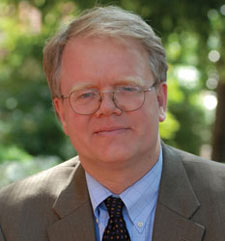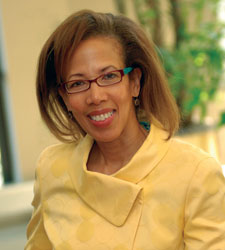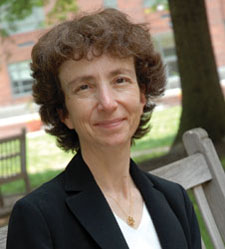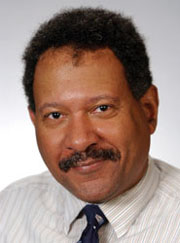
GW Law Professors share a global perspective
By Chris Williams
GW Law’s faculty members find commonalities in unexpected places. Four well-traveled professors, each with diverse backgrounds and areas of expertise, share their insights on some of the ties that bind us with our foreign counterparts. This is the third article in a series that takes a closer look at the faculty at GW Law School who shape international and comparative law.
Christopher R. Yukins
Associate Professor of Government Contracts Law; Co-Director of the Government Procurement Law Program

Christopher R. Yukins
Jessica McConnell
Traveling the world, Christopher R. Yukins has discovered that it’s actually a pretty small place.
The professor of government contracts law is working with global experts on an effort to reform a United Nations model procurement law during meetings twice a year in New York and Vienna. It appears we are more alike than different, he says.
“As we’ve discussed proposed reforms, again and again we’ve realized that the laws in our respective nations are remarkably identical,” he says. “This is an exciting time in government procurement law around the world. It’s becoming clearer and clearer that there are tremendous lessons to be shared.”
Almost all systems, Yukins says, demand value for taxpayer money while trying to maximize competition, integrity, and transparency.
By mapping out these common concerns, GW Law School’s Government Procurement Law Program, which Yukins co-directs with fellow faculty members Steven L. Schooner and Joshua I. Schwartz, is having an impact on legal systems throughout the world. In fact, Yukins found evidence of the program’s influence on a recent trip to Africa.
“I was sitting in a procurement conference in Ghana last year sponsored by the World Trade Organization,” he says. “I opened up the conference materials, thousands of miles from home, and whose article should be there, but Steve Schooner’s.”
The scope of the procurement market worldwide—over $400 billion in the federal market in the United States alone and more than $1 trillion in the European market—demands that the program’s faculty members stay busy. Yukins traveled to Nigeria in June to expand the program’s international ties; there he contributed to a World Bank project to build the country’s procurement workforce. In July, he traveled to Germany to help establish a biannual summer seminar in cooperation with Professor Martin Burgi at the University of the Ruhr-Böchum. Yukins and other professors in the program also will work this year on initiatives in Austria, France, Italy, the Netherlands, the United Kingdom, and Uruguay, among other countries.
The lessons learned internationally are used to shape the procurement program’s curriculum at GW Law and build a legal workforce that is more prepared to compete in the global market, Yukins says.
“What we’ve discovered … is that if we use the common international concerns in building our own curriculum, the lessons we teach are in fact immediately understandable by our international colleagues,” he says. “Comparative analysis has drawn our curriculum in a more normative direction, which in the end, I think, makes our students better lawyers.”
The guiding principles of integrity, transparency, and fair competition that are driving the reform efforts around procurement law form the basis for the kind of lawyers the school hopes to produce, Yukins adds.
“At the end of the day, good lawyers have to be good leaders. And a good leader has to be able to lead from a basic set of principles. We build our curriculum around organizing principles so that our students are comfortable speaking from and leading from those principles as they go out into practice.”
Yukins joined the GW Law faculty in 2002 with a strong background in procurement law. As a partner in private practice, he focused on high-tech companies, government contracts, and litigation. Prior to working in the private sector, he was a trial attorney with the U.S. Department of Justice, Civil Division, where he handled major claims against the United States in contracts litigation.
And to say the law is in Yukins’ blood is more than a simple cliché, as he discovered on a recent trip to England.
“A few years ago I gave a German colleague a ride across England to a conference, probably because he was even more scared than I was to drive on the left-hand side of the road,” he says. “To return the favor, he sent me a copy of an article that my mother wrote in a German law journal in 1960, which I had never seen before.”
Yukins’ mother passed away when he was a child. He knew she was a legal scholar but did not know the extent of her work. Looking at the article, he could not read the academic German, but he understood the footnotes.
“My mother was citing American administrative law for comparative purposes,” Yukins says. “So what my mother was doing in 1960, I’m doing in 2008, trying to understand two legal systems through a comparative lens.”
“It’s genetic,” he adds with a laugh.
Karen Brown
Donald Phillip Rothschild Research Professor of Law

Karen Brown
Jessica McConnell
After 20 years in teaching, Karen Brown is still surprised when her students share her enthusiasm for tax law.
“They have other classes, and I’m sure tax can be one of the more tedious ones,” Brown says of her GW Law students this year. “There are things that I think are fascinating, and I’m sure there are some that students find boring. It was amazing to me that they seemed to be as intrigued by some of the trends in international taxation as I was.”
Perhaps it’s because the students saw what Brown sees in her chosen area of expertise—the power to improve the lives of the less fortunate.
“One of the things that fascinates me about tax law is that it can be used as a tool to correct some social and economic injustices that we observe today,” Brown says. “To me, that’s the real reason I’m studying and teaching tax law—to be able to provide some insight into using tax law in that way.”
Brown made this case at a May law conference in Montreal, where she presented a paper titled “Are blacks too heavily taxed?” Her research examines ways that the Internal Revenue Code exacerbates certain discriminatory patterns in the lives of many African-Americans, focusing on the home mortgage interest deduction and the gradual, deliberate shift of the federal income-based tax to a consumption-based tax. In other words, the system favors business activity and investment, shifting the tax burden more heavily toward people who are living paycheck to paycheck.
“The home mortgage interest deduction does nothing to provide homes for people who may be working but may not have the assets to pay for a home,” Brown says. “The shift to a consumption tax is going to place the tax burden more heavily on consumers, people who don’t have any choice but to consume, because they don’t have the ability to save—middle or lower income workers who just have no discretionary assets in terms of savings.”
Over the last year, which included a fall sabbatical, Brown had the opportunity to see how other countries are grappling with many of the same issues. She presented a paper in Berlin last summer, attended a conference in Hong Kong in December on the United Kingdom’s legacy in tax law, and currently is researching U.S. international tax policy toward the Caribbean region.
“One of the things I’ve noticed is how central the legal system and developments in the U.S. are to people in other countries,” Brown says. “When I visit other countries and study their different legal systems, it’s striking how many similarities there are. No matter what the culture, people end up coming up with similar mechanisms for dealing with issues.”
Brown has co-authored a book on international tax transactions and co-edited a book on tax reform, along with numerous articles, book chapters, and presentations on federal taxation. Before joining the GW Law School faculty 10 years ago, Brown taught at both the Brooklyn Law School and the University of Minnesota, where she also served as associate dean for academic affairs. Her legal career includes experience in both public and private practice as a trial attorney for the U.S. Department of Justice, Tax Division, and as an associate at Steptoe & Johnson in Washington, D.C.
“A good place to start is to comb the Internal Revenue Code, really taking a serious look at some of the existing inequities, and to begin a project to displace some of the tax giveaways that go to members of the community deemed by some people to be more worthy than others,” she says. “Look at the tax code to find ways to benefit the lower and middle income folks not only in the U.S., but in other poorer countries as well.”
As she continues to research and argue for tax reform, Brown says she can’t imagine being in a more nurturing home than GW Law.
“I find it an incredibly rich and supportive environment, both from my colleagues and the administration and students,” Brown says. “For somebody who’s interested in the types of issues that I am…there’s a lot of support for whatever I want to do. No one ever complained that my ideas are too liberal, or anything like that. It’s been a great experience. It’s really a wonderful place.”
Naomi Cahn
John Theodore Fey Research Professor of Law

Naomi Cahn
Jessica McConnell
In the United States and abroad, Naomi Cahn is focused on the family and on women’s rights.
Before joining the GW faculty in 1993, Cahn was one of the first law school professors in the country to teach international women’s rights. At GW, Cahn has taught a variety of courses related to family law and has written articles and books covering trusts and estates, domestic violence, adoption, child custody issues, domestic and international women’s rights, and related topics.
She knows the subjects from experience.
As a researcher, Cahn spent two years in the Congo examining sexual violence during wartime and was able to witness firsthand the United Nations peacekeeping mission there. In June, she was invited to a meeting at the Finnish Embassy to examine the role of sexual exploitation and human trafficking in international peacekeeping operations. She also recently served as a consultant on a report about the effects of domestic violence during wartime in Afghanistan.
Cahn uses these international experiences in the classroom to examine the integrated nature of the law in people’s lives, she says.
“I hope that my teaching reaches my students at both the jurisprudential level of the law, as well as the practical applications of the law and how the law works, in structuring deals, inside the courtroom, outside the courtroom, nonprofits, and other organizations,” she says.
Cahn is co-chair of the Women in International Law Interest Group of the American Society of International Law, and she has done extensive writing about gender in post-conflict reconstruction. Based on her earlier work as Africa director for GW’s International Institute of Corporate Governance and Accountability, Cahn recently participated in a briefing titled “Transparency in the Oil and Gas Industry: Corporate Performance, Challenges and Opportunities” on Capitol Hill. She discussed Transparency International’s 2008 Report on Revenue Transparency of Oil and Gas Companies, which evaluates major oil and gas companies that operate in 21 countries on their current policies and systems concerning revenue transparency. Cahn is also publishing a related article in the Georgetown Journal of International Law.
This academic year, Cahn, the former associate dean for faculty development, is taking a sabbatical to focus on completing two books. Test Tube Families: Why the Fertility Market Needs Legal Regulation (NYU Press), which will be published in January 2009, explores the relationships that underpin artificial reproductive technology. Red Families v. Blue Families, due to be published also in 2009, looks at the diverging strands in the United States when it comes to family law.
“We are seeing some trends in the red states and blue states,” Cahn says. “What we argue is that different families in different parts of the country are leading different lives and that laws are supporting these different lifestyles. Our basic thesis is that the culture wars are first and foremost about family values.”
The book will delve into many of the hot-button social issues driving these differences, Cahn says, including abortion, abstinence education, gay marriage, teen pregnancy rates, access to contraceptives, custody issues, and more.
Before teaching at GW, Cahn was the assistant director of the Sex Discrimination Clinic and a visiting professor at Georgetown University Law Center. At GW Law, she has been instrumental in gaining faculty approval of a course on transnational family law and international and comparative women’s rights. When she returns from sabbatical, she has plans to teach these courses, as well as a seminar that might focus on the critical questions in the post-conflict transition process in various countries overseas. Teaching, she says, allows her to expand on the vast capabilities of the law:
“I hope students leave with a sense of the comprehensiveness of the law and the ability of the law to help people not just in the United States, but internationally, and to change people’s lives—including their own.”
Robert J. Cottrol
Harold Paul Green Research Professor of Law

Robert J. Cottrol
Robert J. Cottrol already has tackled issues of slavery’s legacy in the United States. Now the legal historian is concentrating on Latin America.
In collaboration with fellow GW Law professor Tanya Hernandez, Cottrol is writing a new book that compares the haunting institution of slavery in our nation with that of the nations to our south.
“It’s a comparative legal history looking at the role of law in developing racial hierarchy and identity in the Americas,” Cottrol says of the still untitled book. “We look at slavery, in the U.S. and Latin America, and ask some basic questions about racial status during slavery, and what kind of legacy did it leave in terms of post-emancipation race relations.”
As part of his ongoing work with the country, Cottrol traveled to Brazil in May and June to deliver lectures on U.S. civil rights law at the Institutes of Public Law in Brasilia and Rio de Janeiro, at the Pontifical University, and at a judicial college in Porto Alegre.
“Brazil I find absolutely fascinating,” Cottrol says, “because it has a constitution, enacted in 1824 when it became an independent empire, in which basically all free people were citizens—including manumitted slaves.”
Despite some debate, Cottrol explains, Brazilian law recognized as citizens a category of persons known as “libertos,” or slaves who had been freed by their masters.
What is difficult for historians to reconcile, Cottrol says, is the fact that slavery continued to exist decades after Brazil’s independence, with slaves subjected to brutal manual labor conditions in the country’s sugar cane fields. Slavery was abolished in the country in 1888.
“I think 19th-century Brazil in some ways is the hardest slave society in the Americas to understand. It is both a liberal society, a colorblind society, and one that has officially abolished slavery, and yet has a very harsh system of Afro-Brazilian slavery.”
As the author of The Afro-Yankees: Providence’s Black Community in the Antebellum Era (Greenwood Press, 1982), and editor of From African to Yankee: Narratives of Slavery and Freedom in Antebellum New England, Cottrol brings a prolific background to the subject.
His 2003 book, Brown v. Board of Education: Caste, Culture and the Constitution (University Press of Kansas), won the Langum Project Prize for Historical Literature. Co-authored with fellow legal historians Raymond T. Diamond of Tulane University and Leland B. Ware of the University of Delaware, the book examines the lengthy court cases, as well as the broader cultural and historical context.
A member of the GW Law School faculty since 1995, Cottrol has taught courses on American legal history and criminal law. He also has taught at Rutgers University and Boston College and was a visiting professor at the University of Virginia. His writings on law and history have appeared in Yale Law Journal, Georgetown Law Journal, American Journal of Legal History, Law and Society Review, Latin American Research Review, Stanford Law Review, and other academic publications.
|